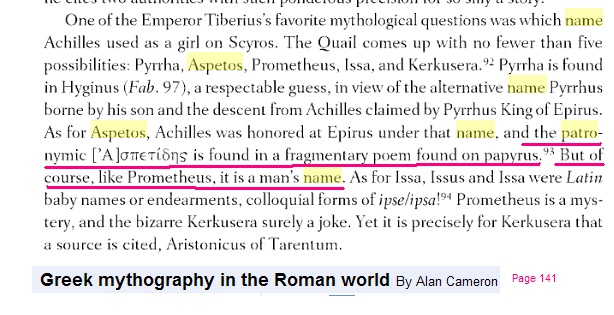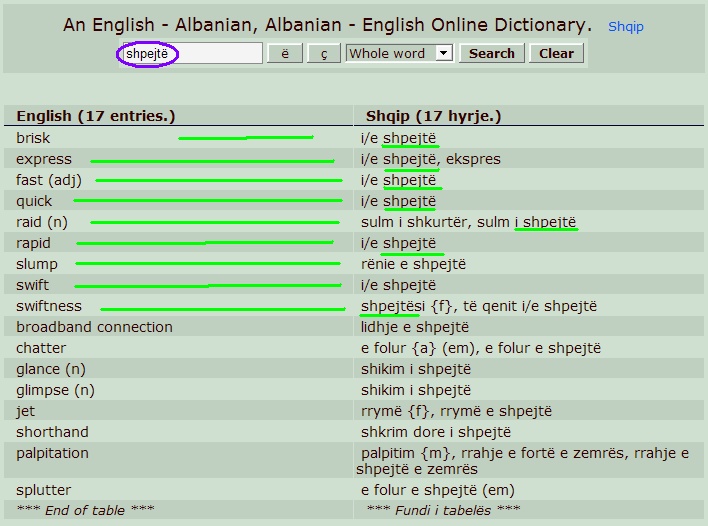Let's analyze carefully the full quote:Of the Thesprotians and Molossians after the great inundation, the first king, according to some historians, was Phaethon, one of those
who came into Epirus with Pelasgus. Others tell us that Deucalion and Pyrrha, having set up the worship of Jupiter at Dodona, settled there among the Molossians. In after time, Neoptolemus, Achilles's son, planting a colony, possessed these parts himself, and left a
succession of kings, who, after him, was named Pyrrhidae, as he in his youth was called Pyrrhus, and of his legitimate children, one was born of Lanassa, daughter of Cleodaeus, Hyllus's son, had also
that name. From him Achilles came to have divine honours in Epirus,under the name of Aspetus, in the language of the country. After these
first kings, those of the following intervening times becoming barbarous, and insignificant both in their power and their lives, Tharrhypas is said to have been the first who, by introducing Greek manners and
learning, and humane laws into his cities, left any fame of himself. Alcetas was the son of Tharrhypas, Arybas of Alcetas, and of Arybas and Troas his queen, Aeacides; he married Phthia, the daughter of
Menon, the Thessalian, a man of note at the time of the Lamiac war, and of highest command in the confederate army next to Leosthenes. To Aeacides were born of Phthia, Deidamia and Troas, daughters, and
Pyrrhus, a son.
http://www.greektexts.com/library/Pl...s/eng/824.html
a) Plutarch pointed out that king Tharrypas was the first who introduced 'Greek manners and learning'. Again I persist on the frequently asked question: If Epirus was the 'heart of Greece' mean that Epirotes were somehow the 'nucleus' of all Greeks. If Epirotes were being of 'central Greeks' then Plutarch would not say that 'Tharrypas' introduced 'Greek learning' on Epirus? It does not make sense to introduce 'Greek manners and learning' in the centre of all Hellenes!
b). Again if Epirotes spoke any tongue close to the Greek, then Plutarch did not need to emphasize 'the language of the country' that mean obviously a entirely different language from Greek. Achilles himself never is related in 'Iliad' with the word 'Aspetos'. The only one who called Achilles as 'Aspetos' is Plutarch. The official etymology of 'Aspetos' related with 'unspeakable,unspeakably great,endless,' is not well-attested because it contains somehow some primaries logic mistakes.

Alan Cameron raises two important conclusions:
i) 'Aspetos' is a patronym (as is it proofed by a fragmentary poem found on papayrus
ii) 'Aspetos' like Prometheus is a man's name
What's wrong with Greek explanation versions?
Finally, 'unspeakable,unspeakably great,endless' cannot be attested neither as patronym nor as man's name, because it does not make sense to have patronyms like this: 'unspeakable,unspeakably great,endless' or even worst as man's name.
1. Aspetos = A + Spetos; 'A' is the short trait of 'asht' (mean 'is' in Alb.). Even in modern times, specifically in Gheg dialect is preserved a such trait short of 'Asht' in 'A'. What's about 'Spetos'. If we drop out the last suffix 'os' the word become on 'Spet' which is an earlier form of Alb. 'Shpejtë' mean 'fast, quick' because again in Gheg dialect we find an another variation from standard form of Albanian 'Shpejtë' in 'Shpetë'. Suma Summarum after this summarized explanation we come to the central point: Aspetos is transparently equivalent with Alb. 'A shpetë',
Aspetos = A shpetë mean 'He is fast/quickly'.

2. This version of explanation has a sufficient logic base since Homer like to use for Achilles the epithet as 'swift-footed' (podas ôkus), a clear indication of swiftness of every action of Achilles.Name Eperios or Epeiros can only be explained using the Albanian language. The meaning of the term is "something that is s deed, above, beyond "(compared to Greece). Homer knows only the name of Thesprotia, the name that replaced Pelasgia (Herodotus II, 56).
Indeed, according to some ancient authors, Epirus with Pelasgiotide were the Pelasgian Argo (Argo is the eponym of the city of Argos).
The city of Thesprotia, called Dodona was the seat of the sacred place that the Pelasgians were dedicated to Zeus and Dodoneo Pelasgians. Here is the prayer that Achilles speaks to Zeus (Iliad XVI, 236 - 237):
"Lord Zeus, Dodoneo, Pelasgians, who live far away, at Dodona, kingdoms from evil and storms around the Selli live, your interpreters, who never washed their feet, and sleep on the floor; once listened as the voice of my prayer, give me glory, much punisti the Achaean army;
This paragraph, inexplicably gone unnoticed by many scholars, is one of the largest and lightest of the Homeric poems and is doubly significant.
First of all because Homer himself recognizes Pelasgian the origin of Achilles and the states freely. Even Zeus himself, god Pelasgian, Achilles would defend itself against the threat Achaean army.
The second issue sees Homer Pelasgian articulate the genesis of religion, which later with small variations, will become the religion of the Greeks.
The name of Achilles is explained referring to the Albanian language, Aspeitos word that comes from the root A'shpeit which translates as the fast, fast in the language of the Pelasgians, and then in Albanian. The Greeks explained the name of Achilles using the expression the great beyond description, (see Plutarch, Pyrrhos i, 3) or simply: the big, full, excellent. However, this interpretation does not coincide with the Greek names that Homer uses in reference to Achilles.
The same thing happens if we consider another name given to Achilles Achilleys, the Greeks translated the term with no lips. Latter name Achilles explains much better through the Albanian language: Aq i Lehto (so light, fast). In any way we see the question of the name of Achilles, the Albanian language is infallible in the explanation.
Thanks to the Albanian language explains perfectly the name of Ulysses, which means traveler (Udhësi).
Therefore the names of the two most popular heroes in the Homeric poems, the Iliad Achilles and Odysseus in the Odyssey, can be explained well using the Albanian language.
In the two poems cited, the author claims to have found 58 citations related to Achilles, among which 18 relate to the concept of speed: swift-footed Achilles, Achilles with light feet, tireless, and the concept of divine occurs 11 times, 25 recurrences show the names that have to do with his tribe and his relatives: son of Peleus, the son of Peleus, and finally, 4 other names that are not relevant.
The name of Achilles, his religion and its place in the hierarchy of deities (the son of the goddess Thetis, whose name is Pelasgians and in Albanian means sea, det) clearly show us the origin Pelasgians. Here's what he says Plutarch (life of Pyrrhus 1 / 3):
'From there [holy site of Dodona, the land of Molossi, the reign of his son Neoptolemus] Achilles was welcomed as a god in Epirus, where the language of the place took the name of Aspetos.
Plutarch was well aware that the inhabitants of the lands of Molossi or Thesprotia, or the dodonei, spoke a language other than Greek, speak the local language.
based on the book GRECE (MYCENIENS = PELASGES) ou la solution d'une enigme author Mathieu Aref
A characteristic of Homer's style is the use of epithets, as in "rosy-fingered" dawn or "swift-footed" Achilles. These epithets were metric stop-gaps as well as mnemonic devices for the aoidos (singer) — both, signs of the deep oral tradition that preceded the written codification of the Iliad and Odyssey.
Moreover, epithets in epic poetry from various Indo-European traditions may be traced to a common tradition going much deeper into prehistory. For example, the phrase approximating "everlasting glory" or "undying fame" can be found in the Homeric Greek kleos aphthiton and the Sanskrit śrávo ákşitam. They "were, in terms of historical linguistics, equivalent in phonology, accentuation, and quantity (syllable length). In other words, they are descendants from a fragment of poetic diction (reconstructable as Proto-Indo-European *klewos ņdhgwhitom) which was handed down in parallel over many centuries, in continually diverging forms, by generations of singers whose ultimate ancestors shared an archetypal repertoire of poetic formulae and narrative themes."[1]
A name plus an epithet constitute a formula which exactly fits the metric structure of the verse. The use of formulas is characteristic of ancient epic poetry.
Homer used epithets not merely to complete rhythm patterns. Epithets increase the meaning of each noun that they alter. Epithets can tell of the character’s origin, parentage, appearance or state, skill-set, position, or heroic quality. At the same time, he distinguishes between Homer’s two different types of epithets: the special and the generic. Special epithets are used exclusively for a particular character, while generic epithets are used repeatedly for a class of characters. Yet this distinction is not always clear; thus, the epithet “master of the war-cry” is used predominantly with Menelaus, yet on occasion also to describe Diomedes.[2]
When they were assembled and gathered together, among them arose and spoke swift-footed Achilles: "Son of Atreus, now I think we shall return home, beaten back again, should we even escape death, if war and pestilence alike are to ravage the Achaeans. But come, let us ask some seer or priest, or some reader of dreams—for a dream too is from Zeus—who might say why Phoebus Apollo is so angry, whether he finds fault with a vow or a hecatomb; in hope that he may accept the savour of lambs and unblemished goats, and be willing to ward off the pestilence from us."
http://www.theoi.com/Text/HomerIliad1.html
